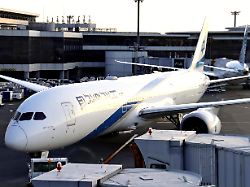A number of airlines have stopped their connections to Tel Aviv. They estimate the risk since the Hamas attack is too high. One airline that is sticking with its operations is Israel’s El Al. It is not only known for its strict security precautions.
Following the Hamas attack on Israel at the weekend, many airlines suspended their flights to and from Israel. The arrival boards at Ben-Gurion Airport in Tel Aviv read: Lufthansa, Air France, Ryanair, Emirates, Aegan Airlines and American Airlines are all canceling their connections to the Israeli metropolis.
Normally, the Lufthansa airlines alone have 17 flights per day to Israel in their program. Due to the still unclear situation, the company has now suspended air traffic to Israel up to and including October 22nd.
According to aviation expert Gerd Wissel, the airlines themselves decide whether to stop flights based on their risk assessment in cooperation with security authorities: “The decision as to whether flights are to be stopped is initially the responsibility of the airlines. The airlines’ primary concern when assessing the situation is: Can the safety of employees on site and also during the flight? Secondly, it’s also generally about the safety of people and machines,” says the aviation expert in an interview with ntv.de.
In his opinion, the decision to stop regular air traffic was the right one – even if the loss certainly hurts Lufthansa. After all, the connection between the USA and Israel via Europe is an attractive business. “This is one of the reasons why airlines certainly don’t make the decision to stop regular flights easy,” says Wessel.
El Al: Security precautions are second to none
While there are only a few regular flights from Israel, the Israeli airline El Al is stepping in with additional flights between Tel Aviv and New York, Paris, Rome and some other European cities. The airline also maintains its own Flight operations, including connections to Munich and Frankfurt, will be maintained.
El Al is not only known for strict safety precautions that are unparalleled in the aviation industry. Unlike its competitors from the USA or Europe, the airline has another decisive advantage: some of the aircraft are equipped with a missile defense system, which is also used in military aircraft. The system, called Flight Guide, detects potential threats from the air and is able to neutralize them. The system was developed in response to the shelling of an Israeli aircraft by Islamists in Mombasa, Kenya, in 2022. At that time, the projectile narrowly missed its target.
According to the industry portal “Aviation Direct”, El Al’s aircraft are equipped with sensors that detect missiles early by analyzing infrared and electro-optical signals. Once a missile has been registered, the system determines speed and course, thereby determining the trajectory and the likely point of impact. In order to neutralize the threat, the pilot can throw so-called flares, i.e. exchange bodies, from the aircraft. In this way, the enemy projectile is deflected off course.
The system was developed by Israel Aircraft and installed at a cost of $750,000 each. El Al does not reveal how many of the 46 aircraft fleet are equipped with the system. The Israeli government financed the first missile defense installation.
In order to counter the risk of terrorist attacks on civilian aircraft, British Airways had also considered installing missile defense systems in its own fleet. However, the airline decided against it due to the high costs for its 330 aircraft.
Insurers no longer cover flights
Aviation expert Wissel assumes that missile defense systems on civilian aircraft will remain the exception. On the one hand, this is a highly complex military system that is subject to strict export restrictions. On the other hand, it is subject to very high requirements for installation, maintenance and operation.
Some airlines are currently foregoing flights to and from Israel, and not just because of the high security risk: insurance companies that some airlines use no longer cover flights to Tel Aviv. According to the Times of Israel newspaper, the Israeli parliament is preparing to grant insurance guarantees worth five billion dollars. This is intended to ensure that El Al, among other things, can maintain its operations. Without the government guarantee, Israeli airlines could lose their insurance coverage as early as this Saturday.
However, Wissel is certain that at the latest when the airport is directly involved in the fighting, all air traffic will come to a standstill. “The moment civilian aircraft are shot at, the airspace is no longer safe.”
